 Petzlover
Petzlover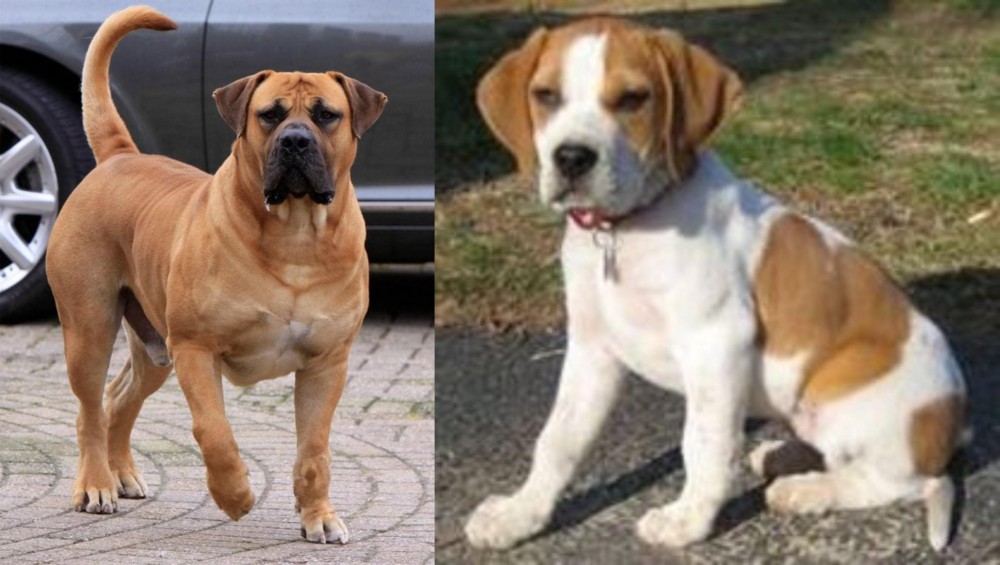 Boerboel is originated from South Africa but Francais Blanc et Orange is originated from France. Both Boerboel and Francais Blanc et Orange are of same height. Boerboel may weigh 54 kg / 120 pounds more than Francais Blanc et Orange. Boerboel may live 4 years more than Francais Blanc et Orange. Both Boerboel and Francais Blanc et Orange has almost same litter size. Both Boerboel and Francais Blanc et Orange requires Low Maintenance.
Boerboel is originated from South Africa but Francais Blanc et Orange is originated from France. Both Boerboel and Francais Blanc et Orange are of same height. Boerboel may weigh 54 kg / 120 pounds more than Francais Blanc et Orange. Boerboel may live 4 years more than Francais Blanc et Orange. Both Boerboel and Francais Blanc et Orange has almost same litter size. Both Boerboel and Francais Blanc et Orange requires Low Maintenance.
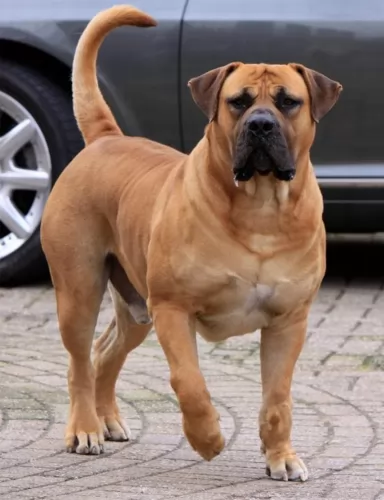 The name ‘Boerboel’ is derived from an Afrikaans/Dutch word, and the large Boerboel dog from South Africa has been specifically bred to be a farmer’s dog. Bred also to be a strong guard dog, the Boerboel is a mix of different African and European breeds, which in all likelihood, will include the Bullmastiff, the Rhodesian Ridgeback and the Bulldog. These dogs were used to hunt baboon and leopard.
The name ‘Boerboel’ is derived from an Afrikaans/Dutch word, and the large Boerboel dog from South Africa has been specifically bred to be a farmer’s dog. Bred also to be a strong guard dog, the Boerboel is a mix of different African and European breeds, which in all likelihood, will include the Bullmastiff, the Rhodesian Ridgeback and the Bulldog. These dogs were used to hunt baboon and leopard.
There is some information that suggests that the Boerboel was brought to South Africa by Jan van Riebeeck in 1652. Other information suggest that the dog is a descendant of the old Boer Hund, a powerful animal which was invaluable to the farmer.
In was in January 2010, that the American Boerboel Club was elected as the AKC’s Parent Club. The Boerboel was accepted into the Miscellaneous Class in the Working dog group.
 The Chien Francais Blanc et Orange is one of the three versions of the Chien Francais. There is the Francais Blanc et Noir and the Francais Tricolor. These scent hounds were distinguished by their colors. The Francais Blanc et Orange like the other two, was a descendent of a variety of English and French hunting hounds, including the Hound of Saintonge.
The Chien Francais Blanc et Orange is one of the three versions of the Chien Francais. There is the Francais Blanc et Noir and the Francais Tricolor. These scent hounds were distinguished by their colors. The Francais Blanc et Orange like the other two, was a descendent of a variety of English and French hunting hounds, including the Hound of Saintonge.
The Hound od Saintonge is extinct but has several breeds coming from his line including the Billy – a pointer. Similar to the Francais Blanc et Orange, the Billy hunted in packs. Coming from these roots the Francais Blanc et Orange was developed around the 1900’s. Many considers the Chien Francais trio to be the Newest and Rarest French Hounds. The Francais Blanc et Orange is a white and orange hound, considered to be the rarest of the three. They were developed by crossing English Foxhounds with French Scent Hounds.
The Francais Blanc et Orange is a born hunter and a good one at that. In his pack he is happy and superbly equipped for the hunt. His vision and scenting skills are unsurpassed. They can cover a large expanse of territory in a very short period of time. They were known for hunting large boar and deer as well as small prey like foxes or rabbits. They were recognized as a separate breed by the UKC in 2006 but are not recognized by the AKC.
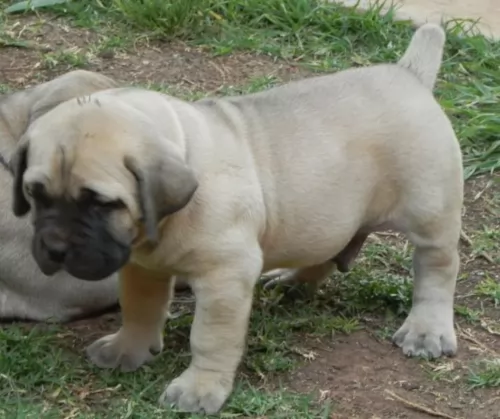 The Boerboel is a big, strong dog with powerful muscles. His height is between 61 – 66cm. He is similar looking to the Boxer dog, just heavier and bigger. The head of the dog is broad and big and the short, smooth coat can be of various shades, with breeders trying to achieve a single color of light tan and with no white. Their coats can also be red, different shades of brown and brindle.
The Boerboel is a big, strong dog with powerful muscles. His height is between 61 – 66cm. He is similar looking to the Boxer dog, just heavier and bigger. The head of the dog is broad and big and the short, smooth coat can be of various shades, with breeders trying to achieve a single color of light tan and with no white. Their coats can also be red, different shades of brown and brindle.
The dog has a black facial mask and the eyes are brown with the ears being of medium length and floppy. The Boerboel’s tail has always been docked, but today breeders are keeping the tail long. Many Boerboel lovers object to this, saying it detracts from the distinctive look of the Boerboel.
The Boerboel can be a wonderfully loyal and loving pet to their owners. They are territorial dogs and suspicious of strangers. This is a dog where it is imperative that they receive training and socialization as a puppy. They have leanings towards being aggressive so they wouldn’t be recommended to first time dog owners, unless of course the first time owners are firm and strong.
Boerboels raised the right way can be gentle giants. They often get bad publicity as regards to aggression, but this is because of they way they have been raised. Boerboels have been bred to be tough and fearless and they make excellent watchdogs. When raised and trained correctly, they make awesome, devoted companions, even around children and other pets.
 The Francais Blanc et Orange is a large , muscular and lean hunting dog, a typical pack hound out of France. They have a flat to somewhat domed head, long legs, and dropped, long ears and a square muzzle. The nose is either orange-brown or black and has large nostrils. Their eyes are deep set, dark and widely spaced. They have a deep chest which leads to their propensity toward the situation of bloat. This breed is smaller than the Chien Francais Blanc et Noir that hunts in packs. The skin is the fur’s color. They are athletic and display tremendous perseverance.
The Francais Blanc et Orange is a large , muscular and lean hunting dog, a typical pack hound out of France. They have a flat to somewhat domed head, long legs, and dropped, long ears and a square muzzle. The nose is either orange-brown or black and has large nostrils. Their eyes are deep set, dark and widely spaced. They have a deep chest which leads to their propensity toward the situation of bloat. This breed is smaller than the Chien Francais Blanc et Noir that hunts in packs. The skin is the fur’s color. They are athletic and display tremendous perseverance.
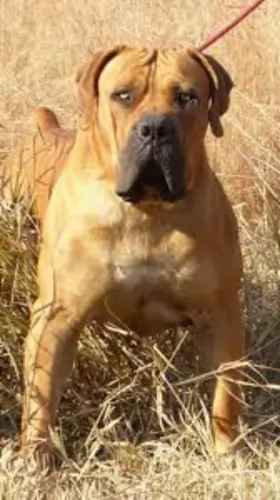 A well trained, socialized Boerboel makes a splendid pet. This is one breed known to have excellent guard- and watch dog characteristics. Boerboels are known for being protective when necessary. When not on guard, they make wonderful pets. He’ll need plenty of exercise, but he loves to also spend time indoors with his human family.
A well trained, socialized Boerboel makes a splendid pet. This is one breed known to have excellent guard- and watch dog characteristics. Boerboels are known for being protective when necessary. When not on guard, they make wonderful pets. He’ll need plenty of exercise, but he loves to also spend time indoors with his human family.
This a a bold, fearless dog who becomes devoted to his family. With the right training he is obedient and affectionate and knows how to behave appropriately indoors- and outdoors. For such a big dog, the African Boeboel’s temperament can be surprisingly gentle and affectionate around the family that he loves.
 They are not exactly child oriented dogs as they are so oriented toward the hunt and the pack. With serious exercise and mental stimulation, they can become a good family dog, but it is not in their instincts.
They are not exactly child oriented dogs as they are so oriented toward the hunt and the pack. With serious exercise and mental stimulation, they can become a good family dog, but it is not in their instincts.
hunting in packs/scent and vision
He is not suited for apartment life and does need a large, fenced yard to run and play. Being a scent hound, he will constantly be sniffing for a trail to follow so put him to work.
The breed is highly intelligent and easily trainable.
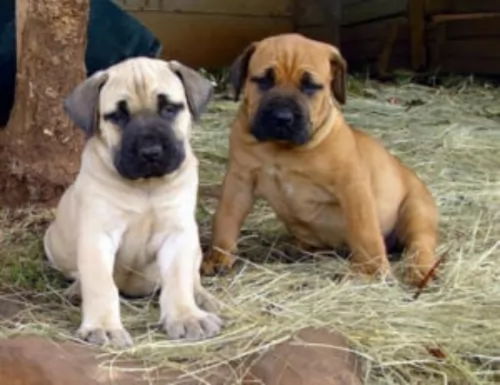 Many health problems experienced with any dog are found in the way dogs are fed, the way they are exercised and the way they are attended to when they are ill. Boerboels are healthy dogs and suffer fewer health defects than most similar breeds. The average life expectancy of a Boerboel is about 10 to 12 years. There are one or two health issues you’ll want to watch out for with your Boerboel.
Many health problems experienced with any dog are found in the way dogs are fed, the way they are exercised and the way they are attended to when they are ill. Boerboels are healthy dogs and suffer fewer health defects than most similar breeds. The average life expectancy of a Boerboel is about 10 to 12 years. There are one or two health issues you’ll want to watch out for with your Boerboel.
This aliment is typically found in large breed dogs. It’s a problem caused by a malformation of the hip joint. Over time hip dysplasia causes discomfort, pain and even arthritis and lameness. It is genetically inherited, with its severity being influenced by environmental factors. There are treatments available to alleviate the symptoms and make the dog more comfortable.
The Boerboel has plenty of muscle mass, and because he is such a large dog with a big appetite, he can lean towards obesity. Plenty of activities will be imperative to maintain muscle mass and ward off obesity. Over-eating suppresses the immune system, so over-feeding your dog simply contributes to ill health.
 As with any dog with log floppy ears, infection is always a concern. Make sure you clean them after every hunting trip, romp or play session.
As with any dog with log floppy ears, infection is always a concern. Make sure you clean them after every hunting trip, romp or play session.
Like many large dogs the Blanc et Orange has a propensity to acquire hip dysplasia. It is known that joint dysplasia has a genetic component and should be screened for. Can cause lameness and arthritis.
This is a real danger for the Blanc et Orange. They are deed chested and these are the dogs that are most likely to get bloat. The stomach is twisted and distended. It can be fatal if not treated quickly.
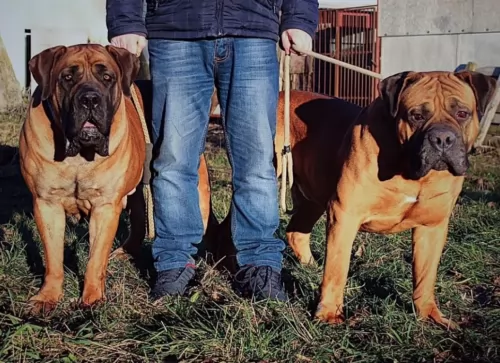 Boerboels are a robust breed and their short hair doesn’t shed heavily. Your Boerbul will require a thorough brushing twice a week to remove loose hair and to keep the coat shiny and healthy.
Boerboels are a robust breed and their short hair doesn’t shed heavily. Your Boerbul will require a thorough brushing twice a week to remove loose hair and to keep the coat shiny and healthy.
Boerboels, just like any other dog, should have their teeth brushed regularly to prevent tartar and plaque build-up. Left unattended, your pet can battle with tooth decay and gum disease.
Your Boerboel puppy will need ‘large breed puppy’ dog food. Speak to your veterinarian about wet- or dry kibble choices. An adult Boerboel will certainly need raw meat in his diet. When you do research, you find that the best Boerboel breeders are advocates for raw feeding. Home made food with rice, vegetables and meat as well as the best quality commercially manufactured dog foods for large breeds are excellent choices but raw meat is imperative as part of every dog’s diet.
 Until about 18 months of age feed between 1 and 1.5 cups of high quality puppy, dry food, made for sporting dogs. Divide this into 3 meals per day.
Until about 18 months of age feed between 1 and 1.5 cups of high quality puppy, dry food, made for sporting dogs. Divide this into 3 meals per day.
3 cups day – After 18 month feed 3 cups per day of a high quality, adult dry food made for sporting dogs. Divide this into 2 meals per day.
Outstanding scent and vision
Even though they are warm and welcoming to people, these are very serous dogs. They usually live outside in packs as they are an incredible pack animal. All they want in life is to hunt. However, if they cant hunt they need at least a couple hours per day od vigorous exercise. They are obviously better off in a rural environment than a city one. Put him in field trails, scent trials, barn hunt and playing fetch.